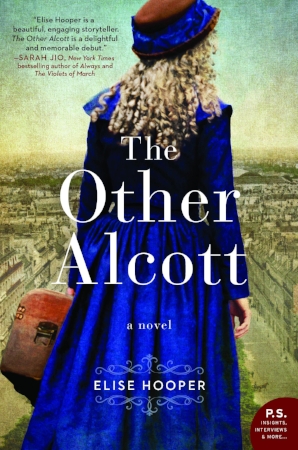WomensHistoryReads interview: Elise Hooper
Another day, another #womenshistoryreads interview! Today I'm talking to Elise Hooper, author of THE OTHER ALCOTT, about historical fiction (of course), revisions that today's history textbooks need, the fascinating Dorothea Lange, and how moviegoers are getting the wrong impression of Jenny Lind.
Elise Hooper
Greer: How would you describe what you write?
Elise: I write historical fiction about women who haven’t received starring roles in traditional retellings of history but tend to be lurking, largely unobserved, in the footnotes and endnotes of non-fiction books. These women have often played an important role in history but tend to be undervalued. In the case of May Alcott, my main character in The Other Alcott, she was a trailblazing painter of the 1870s but people tend to focus their attention on her much more famous older sister, Louisa. When I think about my characters and their stories, I’m particularly interested in exploring how women have navigated the call to produce creative work while balancing their ambitions with love and family.
Greer: What’s the last book that blew you away?
Elise: I couldn’t get enough of Prairie Fires by Caroline Fraser. As a girl, I adored the Little House books and read them over and over, made my dolls calico dresses and bonnets, and threw sheets over chairs to create covered wagons in my family’s living room. In the 1980s, when the Little House television series aired, I fell in love with Melissa Gilbert’s plucky little “Half Pint” and never missed an episode. When my own daughters reached the age to be introduced to the series, I read along with them and discovered a whole new experience. The risks the Ingalls took both fascinated and horrified me. I hadn’t understood the family’s extreme poverty and many run-ins with danger when I read the books as a child, but as an adult, I was astounded. Prairie Fires brought it all to life and Caroline Fraser did an excellent job of framing the Ingalls’s experience with both a wide-sweeping historical lens and psychological analysis of the real people behind the beloved characters. In this excellent non-fiction book, the Ingalls family becomes a fascinating touchstone to learn about a period when our country experienced astounding economic, technological, and social changes.
Greer: If you could pick one woman from history to put in every high school history textbook, who would it be?
Elise: Since I teach high school history and literature, I love this question! I’d focus more on the nineteenth-century’s fights for women’s rights by women abolitionists, suffragists, and labor rights activists. Textbook chapters on World War II also tend to be very male-oriented and focus on the military battles and political leaders, but this was an extraordinary time when women contributed significantly to winning the war through their code breaking work and atomic science research. My students are also always captivated by the civil rights movement of the mid-twentieth century, but I think the mainstream narrative focuses too much on male leadership and must include more women activists, such as Fannie Lou Hamer. (See, I tried to game that question a little bit by proposing some pretty major edits to U.S. History textbooks while providing just one name.)
Greer: What’s your next book about and when will we see it?
Elise: I’m working on revisions for a new novel about Dorothea Lange, the pioneering documentary photographer of the 1930s and ‘40s. While most Americans recognize her work of Dust Bowl migrants, especially her iconic “Migrant Mother” image, few know much about the woman behind the art. Her story is a remarkable one about a woman persevered with her professional ambitions despite many challenges, including a physical disability due to a childhood bout with polio, a troubled marriage, the privations of the Great Depression, and the government’s censorship of her photos. She made many difficult decisions that will fascinate modern readers. This novel will be released in early 2019 by William Morrow.
Greer: That sounds fabulous! Can't wait.
Elise: My question for you: I’m obsessively watching "The Crown" these days and find myself forming a whole new impression of Queen Elizabeth II. Who do you think is another woman whose story has been largely misunderstood and could make for an intriguing television series?
Greer: I'm clearly biased, but I think Kate Warne, the first female detective and the subject of my latest novel GIRL IN DISGUISE, would make a great subject for a TV series. Not so much that her story has been misunderstood, more that it is rarely discussed at all!
But to suggest someone else... I recently read about how opera singer Jenny Lind, also known as the Swedish Nightingale, is used in the movie The Greatest Showman as a kind of villain -- when in real life she was smart, charitable, business-savvy, and a lot of other things the movie didn't show. After reading this article at The Geekiary, I would totally be on board with a Jenny Lind series that sticks closer to the actual truth! (Musical numbers optional, but strongly encouraged.)
For more about Elise and her books:
Twitter and Insta: @elisehooper
https://www.facebook.com/elisehooperauthor/

